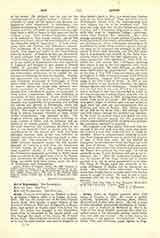

Acton, CHARLES JANUARIUS, an English cardinal, b. at Naples, March 6, 1803; d. at Naples, June 23, 1847. He was the second son of Sir John Francis Acton, Bart. The family, a cadet branch of the Actons of Aldenham Hall, near Bridgnorth, in Shropshire, had settled in Naples some time before his birth. His father was engaged in the Neapolitan trade when he succeeded to the family estate and title through the death of his cousin, Sir Richard Acton, Bart. The Cardinal‘s education was English, as he and his elder brother were sent to England on their father’s death in 1811, to a school near London kept by the Abbe Queque. They were then sent to Westminster School, with the understanding that their religion was not to be interfered with. Yet they not only were sent to this Protestant school, but they had a Protestant clergyman as tutor. In 1819 they went to Magdalen College, Cambridge, where they finished their education. After this strange schooling for a future cardinal, Charles went to Rome when he was twenty, and entered the Academia Ecclesiastica, where ecclesiastics intending to be candidates for public offices receive a special training. An essay of his attracted the attention of the Secretary of State, della Somaglia, and Leo XII made him a chamberlain and attache to the Paris Nunciature, where he had the best opportunity to become acquainted with diplomacy. Pius VIII recalled him and named him vice-legate, granting him choice of any of the four legations over which cardinals presided. He chose Bologna, as affording most. opportunity for improvement. He left there at the close of Pius VIII’s brief pontificate, and went to England, in 1829, to marry his sister to Sir Richard Throckmorton. Gregory XVI made him assistant judge in the Civil Court of Rome. In 1837 he was made Auditor to the Apostolic Chamber, the highest Roman dignity after the cardinalate. Probably this was the first time it was even offered to a foreigner. Acton declined it, but was commanded to retain it. He was proclaimed Cardinal–Priest, with the title of Santa Maria dell a Pace, in 1842; having been created nearly three years previously. His strength, never very great, began to decline, and a severe attack of ague made him seek rest and recuperation, first at Palermo and then at Naples. But without avail, for he died in the latter city. His sterling worth was little known through his modesty and humility. In his youth his musical talent and genial wit supplied much innocent gaiety, but the pressure of serious responsibilities and the adoption of a spiritual life somewhat subdued its exercise.
His judgment and legal ability were such that advocates of the first rank said that could they know his view of a case they could tell how it would be decided. When he communicated anything in writing, Pope Gregory used to say he never had occasion to read it more than once. He was selected as interpreter in the interview which the Pope had with the Czar of Russia. The Cardinal never said anything about this except that when he had interpreted the Pope‘s first sentence the Czar said: “It will be agreeable to me, if your Eminence will act as my interpreter, also.” After the conference Cardinal Acton, by request of the Pope, wrote out a minute account of it; but he never permitted it to be seen. The King of Naples urged him earnestly to become Archbishop of Naples, but he inexorably refused. His charities were unbounded. He once wrote from Naples that he actually tasted the distress which he sought to solace. He may be said to have departed this life in all the wealth of a willing poverty.
JOHN J. A’ BECKET.

